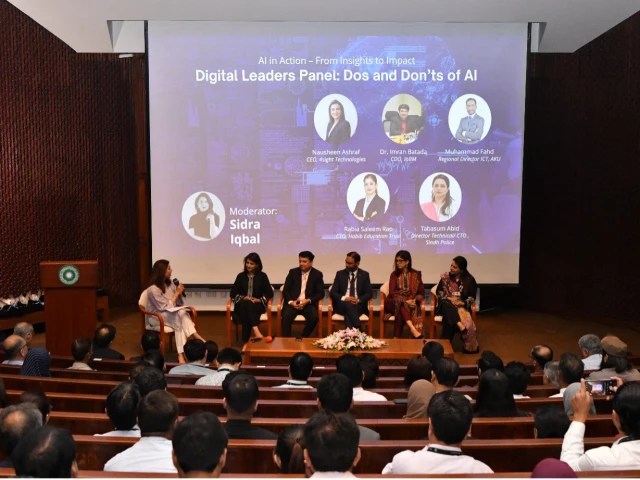On Thursday, November 6th, HR and ICT divisions at the Aga Khan University (AKU) collaborated on “AI in Action – From Insights to Impact”, a conference that sparked deep reflection on the transformative role of Artificial Intelligence.
The conference was opened by Navroz Surani (Vice President, HR, AKU), who welcomed the audience and highlighted that AI was on everyone’s mind, with individuals seeking to understand how it would affect their livelihoods, as well as how it could transform the Future of Work. He recognized that colleagues globally were seeking to understand what skills to develop to thrive in an AI-enabled future.
Our esteemed Keynote Speaker, Faisal Anwar (CDO, HBL), then set the stage by exploring how AI continues to shape numerous industries and decision-making processes, while extolling the importance of continuous learning to keep abreast of new developments. He gave the powerful image of the bank of the future being simply “a box with a computer in it”, as individuals seek out the same high service standards while minimizing transaction times and branch visits.
Shaukat Ali Khan (Advisor to the President for ICT, AKU and Executive CDIO, NHS West Yorkshire) and Sidra Iqbal (Journalist and Anchor, Aaj TV) followed with an inspiring Fireside Chat, where Shaukat highlighted cutting edge innovations underway at the NHS, including the near-future possibility of predicting individual disease risks through mobile apps, and the concept of a “Digital Mother” an AI companion designed to support children when parents are away.
He emphasized that while AI offers powerful tools, human judgment and critical thinking remain irreplaceable. AI is already transforming healthcare, with the ability to predict life-threatening diseases like cancer based on DNA profiles, a venture actively being pursued. When used effectively, technology can reduce workloads and free up time for more meaningful tasks. However, human oversight is essential, especially in healthcare, to validate AI-generated results and ensure ethical decision-making.
Machines may provide data and insights, but it is humans who must interpret and act on them. The growing relevance of virtual hospitals also presents a promising solution to deliver quality care to underserved populations, particularly in remote regions. At the same time, challenges such as data poisoning and model theft must be addressed during AI development to ensure safety, trust, and reliability.
A panel discussion, moderated by Sidra Iqbal (Journalist and Anchor, Aaj TV), followed, featuring Nausheen Ashraf (CEO, 4sight Technologies), Dr Imran Batada (CDO, IoBM), Muhammad Fahd (Regional Director ICT, AKU), Rabia Saleem Rao (CTO, Habib Education Trust), and Tabasum Abid (CTO, Sindh Police). Each panelist brought their unique perspective and expertise into a discussion that covered data sensitivity, gender and AI, mental health risks, the impact of AI on critical thinking, successful AI implementations, and how the use of (and familiarity with) AI differs across generations.
Last but not least, Shagufta Hassan (Vice-President Finance & CFO, AKU) shared inspiring closing remarks. She reminded the audience that “AI can tell you to take 10,000 steps, but it can't make you take those steps", thus highlighting that even in a world full of technological marvels, the responsibility for one’s success ultimately still lies with the individual.



COMMENTS
Comments are moderated and generally will be posted if they are on-topic and not abusive.
For more information, please see our Comments FAQ